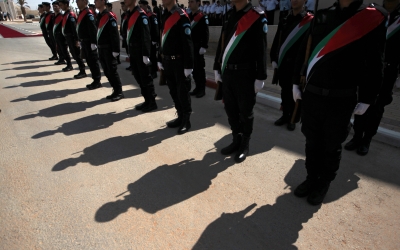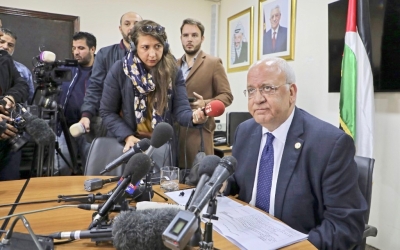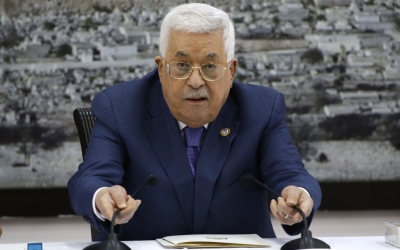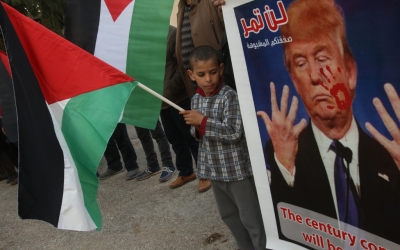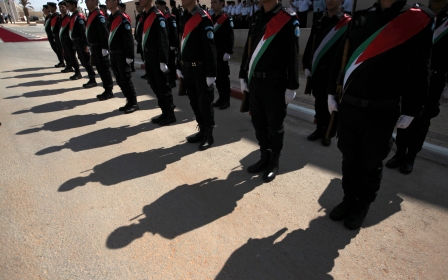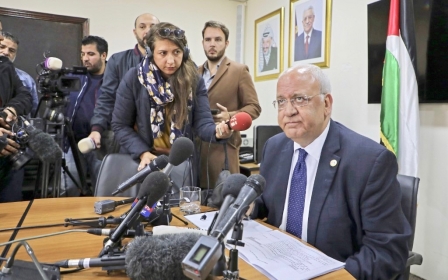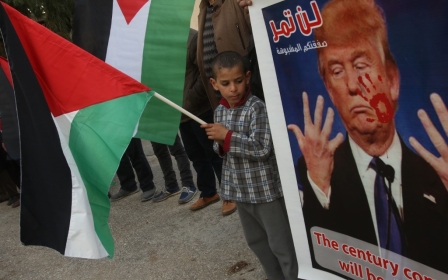Palestinians not buying PA threats to end security coordination with Israel
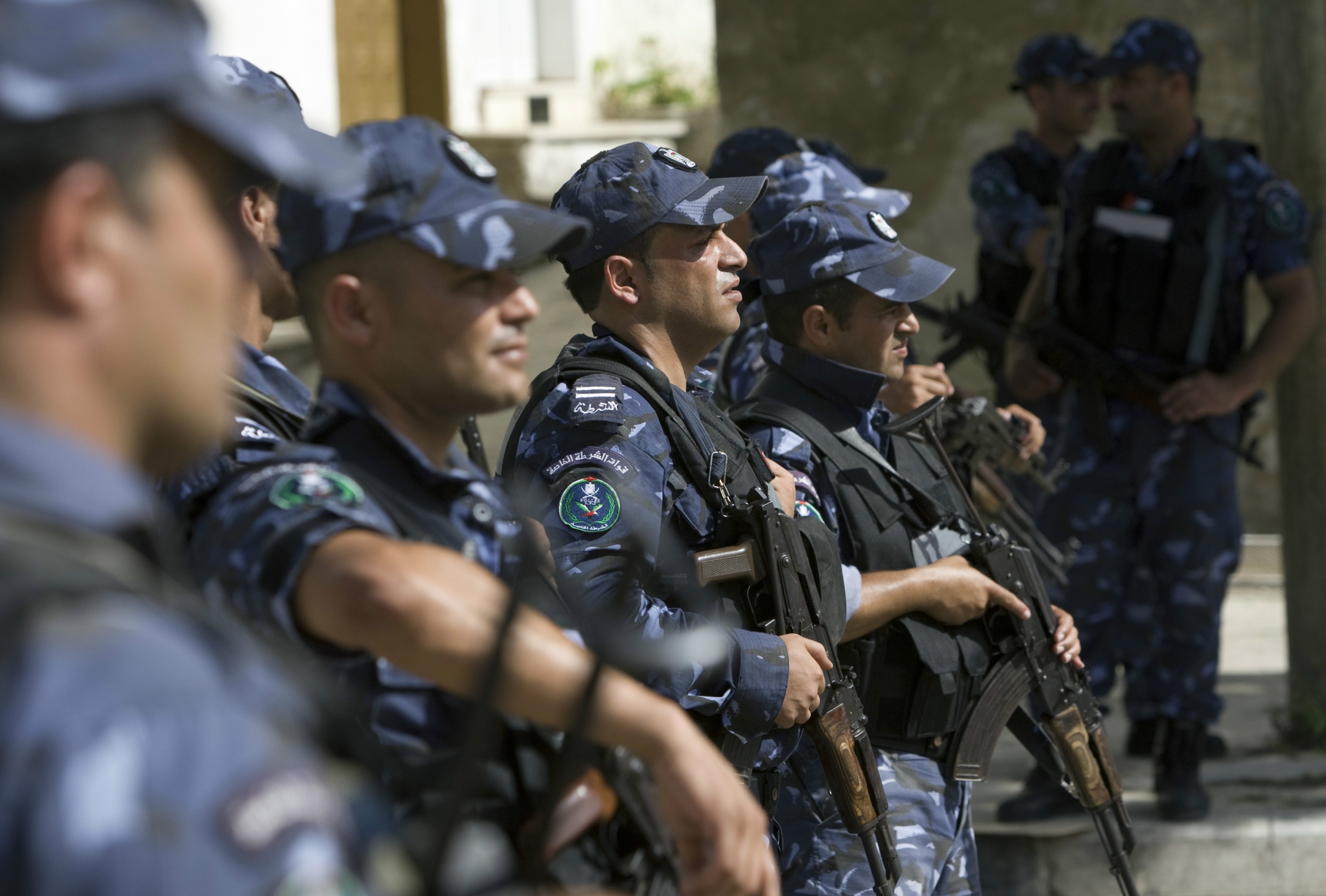
Palestinians have voiced incredulity at Palestinian Authority President Mahmoud Abbas's declaration that he will end security coordination with Israel following last month's unveiling of the US administration's "deal of the century".
Many say Abbas’s words have become recurring, meaningless threats, with no real action taken on the ground despite the widespread outrage surrounding the plan and its undermining of the most basic principles of the Palestinian cause.
Abbas announced the end of security coordination with Israel during an emergency meeting of the Arab League in Cairo on 1 February.
He said: “We told Israel and the United States that we will not have any more ties with them, including at the security level," adding later that the step was taken "out of a blatant breach of agreements on Israel's part," and that Israel bears full responsibility.
Despite his seemingly decisive statement during the Arab League meeting, Abbas delivered a different message a few days later to his PA cabinet.
On 3 February, Abbas told the cabinet: "We will stop security coordination without discussion,” but then added a key conditional clause, “if they continue with this plan”.
Abbas’s statements go together with those of other Palestinian officials and with recent developments.
In an interview with local Wattan TV, Tawfiq al-Tirawi, a member of the ruling Fatah party's central committee, confirmed that the controversial practice continues.
“Stopping security coordination is the last card in the hands of the Palestinian Authority, and it will be the beginning of the end," Tirawi told Wattan.
"Yasser Arafat was put under siege only when he stopped security coordination.”
'Military confrontation is on the table'
Amid uncertainties about security and the future for Palestinians, many on the street say the PA’s threats are part of a familiar cycle, one which attempts to absorb widespread anger but takes no concrete action.
Abdulrahman Alawi, a 20-year-old student from the village of Deir Jarir, east of Ramallah city, told Middle East Eye he believes that Abbas’s statements have been contradictory.
Alawi pointed to the PA leader's speech at the Arab League in which “he said he doesn’t believe in the armed struggle and expressed willingness to establish a demilitarised state – which are clauses within the US-Israeli plan and its goals”.
“The PA continues to persecute every person that resists the occupation, and arrests those it suspects of doing so, and then says that it wants to stop security coordination, in contradictory and unconvincing speeches,” said Alawi, who studies at Birzeit University in Ramallah.
Wissam Owaidat, a 21-year-old also studying at Birzeit, branded the PA's position as weak.
“The response to the 'deal of the century' should have been centred on a rigid Palestinian plan that re-emphasises the underpinnings of the Palestinian cause,” Owaidat told MEE, adding that the PA should make clear that “a military confrontation is on the table if matters take a turn in that direction”.
“The decision to end security coordination should be a calculated strategy, not merely a reaction,” said Owaidat.
He explained that if the PA were to end this practice, it would have to undergo serious structural and functional changes as a security body for Israel and would have to “search for a regional ally to support Palestinian rights”.
In reality, continued Owaidat, to do this would mean to “disengage from Israel on all fronts,” such as the economy and medical industry, to free itself from a network of complex relations that have made the PA completely dependent and under the control of the Israeli occupation.
“This necessitates the presence of a strategic plan that provides an alternative for Palestinians,” said Owaidat.
Financial dependency
As part of the Oslo Accords signed in 1993 and 1995 between Israel and the Palestine Liberation Organization (PLO), an umbrella of the major Palestinian political parties, the PA was established as an interim self-governing body that would lead to a state on the Palestinian territories that Israel occupied in 1967 – East Jerusalem, the West Bank and the Gaza Strip.
However, 25 years since the signing of the agreements, Israel has only expanded and continued to build settlements on occupied Palestinian land, while the PA is confined and dependent on Israel, with limited, mostly administrative control confined mainly to city centres.
The Oslo Accords remain in force, with aspects such as financial dependency and security coordination still intact.
Security coordination involves PA intelligence sharing with Israel on Palestinians who are suspected of carrying out, or have carried out, attacks in response to the occupation – a practice that is seen as highly controversial among Palestinians.
Little is known about the details of the policy, but one anonymous Fatah party official told MEE: "How does security coordination work? When Israeli forces enter one of our areas, something that happens almost every night, the Israeli side informs us of the entry time so we can withdraw all our policemen from the streets.”
“And if that channel stops, the armed policeman might clash with the armed Israeli soldiers in any square, any street, in any city, which would lead to a breakdown in the security system.”
Also as part of the Oslo Accords, Israel collects customs revenues on goods imported to the Palestinian territories and transfers them to the PA at the end of each month.
The threat of not receiving such vital funds obliges the PA to comply with the other aspects of the accords.
Persecuting political activists
For years, security forces from the Fatah-ruled PA have persecuted hundreds of political activists who express opposition to both the PA and the Israeli occupation, based mostly on their political affiliations, a practice that has been documented by several human rights groups.
Most recently, Addameer, a Ramallah-based Palestinian prisoner rights organisation, issued a report revealing that the PA carried out at least 100 arrests during 2019 across the cities of Ramallah, Hebron, Nablus, Tubas and Jenin.
The arrests and interrogations mostly targeted university students, according to the report, which documented the torture and ill-treatment of a large number of those students who were detained.
Upon their release from PA prisons, the report found that many of the students were then re-arrested, but this time by the Israeli army.
Alawi, from Deir Jarir, is one of several students arrested and persecuted in September 2019 on the basis of their activism with the Hamas-affiliated Islamic bloc student party at Birzeit university.
The students were only released after a widespread campaign was launched by other students to demand the freedom of their peers.
Alawi told MEE there is a “clear delegation of tasks between the PA and the Israel in persecuting and arresting students,” explaining that “the security services collect information and provide it to the [Israeli] occupation, after which the [Israeli army] charges students based on the PA’s claims, or it merely takes the PA’s file and keeps the students under administrative detention”, without levying formal charges against them.
“A number of students who were interrogated by the PA’s security services were re-arrested and interrogated by the [Israeli] occupation on the same file and the same information,” said Alawi.
“I am a student union activist at Birzeit university. Ending security coordination would entail a lot of things for me – I will be able to work freely, and I will no longer be afraid of arrest and persecution from both sides.”
New leadership needed
Abdel Sattar Qassem, a professor of political science at An-Najah University in Nablus, said he believes that “Abbas has lost the trust of the Palestinian people”.
“If there is any kind of trust, he is benefiting only at a personal and material level from it, especially since the head of the CIA denied his statements on the end of security coordination,” Qassem told MEE.
Qassem was referring to a meeting revealed by Israeli media between Gina Haspel, the director of the CIA, and Majed Faraj, the head of the PA's intelligence services, in Ramallah days after the Trump plan was announced.
“If there were no security services provided by the PA to Israel, the PA would have collapsed a long time ago," said Qassem.
"It remains in existence for the sake of Israel’s security interests.”
“The Palestine Liberation Organization (PLO) has entrapped us with security coordination, as it has with financial aid from abroad.
"It has become difficult to disentangle the Palestinian reality from all these obstacles.
“What we need today is a new leadership, only produced by elections,” said Qassem, explaining that Abbas’s tenure ended in 2009 and that he is no longer authorised to speak on behalf of the Palestinian people.
"Today, he is violating the law and is ruling by force.”
Dependent on Israel's actions
Jihad Harb, a researcher in governance and politics, and a specialist in parliamentary affairs, explained that “ending security coordination means ending the implementation of the Oslo Accords, which are based on three elements: security, economy and civil affairs”.
Stopping security relations, Harb told MEE, would be followed by Israel’s ending of the Paris Protocol agreement, which provides for the transfer of tax funds to the PA.
If the PA ends security coordination, Harb says Israel would financially and economically besiege the authority.
“If the PA no longer receives its tax funds from Israel, that means it cannot continue providing services, and thus that would lead to the collapse of several aspects of the Oslo Accords,” said Harb.
Whether the PA will take any action on the ground depends on Israel’s actions, he says.
“Once [Israel] begins to implement annexation and the deal of the century, it is expected of the PA to implement its threats and end security coordination.”
Middle East Eye delivers independent and unrivalled coverage and analysis of the Middle East, North Africa and beyond. To learn more about republishing this content and the associated fees, please fill out this form. More about MEE can be found here.


